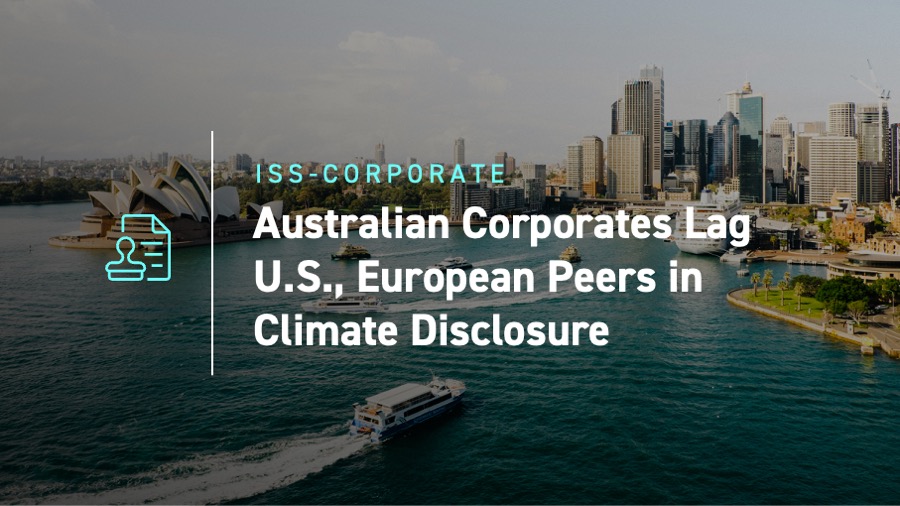Australian Corporates Lag U.S., European Peers in Climate Disclosure
Below is an excerpt from ISS-Corporate’s recently released article “Australian Corporates Lag U.S., European Peers in Climate Disclosure.” The full article is available on the ISS-Corporate online library. INTRODUCTION With the update of Australia’s Sustainable Finance Roadmap in June 2024, Australian corporates are facing tough new rules on climate disclosures as the country aligns itself […]

Below is an excerpt from ISS-Corporate’s recently released article “Australian Corporates Lag U.S., European Peers in Climate Disclosure.” The full article is available on the ISS-Corporate online library.
INTRODUCTION
With the update of Australia’s Sustainable Finance Roadmap in June 2024, Australian corporates are facing tough new rules on climate disclosures as the country aligns itself more closely with global standards related to climate and sustainability goals. The Roadmap introduces key reforms for listed companies, focusing on improving transparency, enhancing financial system capabilities, and strengthening government engagement. Since the initial release of the Roadmap in November 2020, the Australian government has only gradually stepped up efforts to position itself as a leader for sustainable finance in the Asia-Pacific region. ISS-Corporate research found that less than half of the companies in the ASX 300 index are currently aligned with the main global standard for climate disclosures, lagging significantly behind U.S. and European peers. This cautious approach is primarily driven by the dependence of the Australian economy on high emitting industries, such as energy, metals, and mining. The introduction of climate-related disclosures, aligned with Task Force on Climate Related Financial Disclosures (TCFD) recommendations and, moving forward, with the International Financial Reporting Standards (IFRS) S2, marks a significant step towards standardized and globally comparable climate risk reporting.
Key Highlights
- Climate Disclosures: Approximately 48% of Australian companies (ASX 300) meet TCFD disclosure requirements, lagging comparable indices in the U.S. (S&P 500) and Europe (STOXX Europe 600) peers at 83% and 89% respectively.
- Scope 3 GHG Emissions Disclosures: Australia’s issuers trail European and U.S. companies in Scope 3 emissions disclosures. However, the Utilities, Consumer Staples, and Industrials sectors in Australia demonstrate leading practices for some of the most relevant Scope 3 categories, including “Category 5 – Waste Generated in Operations” and “Category 4 – Upstream Transportation and Distribution.”
- Climate Performance: Two-thirds of Australian companies under review have average or below-average climate performance, lagging their respective European and U.S. industry peers by 31 and 21 percentage points, respectively.
By: Ingo Tietboehl, Senior ESG Advisor (Japan), APAC, ISS-Corporate






















